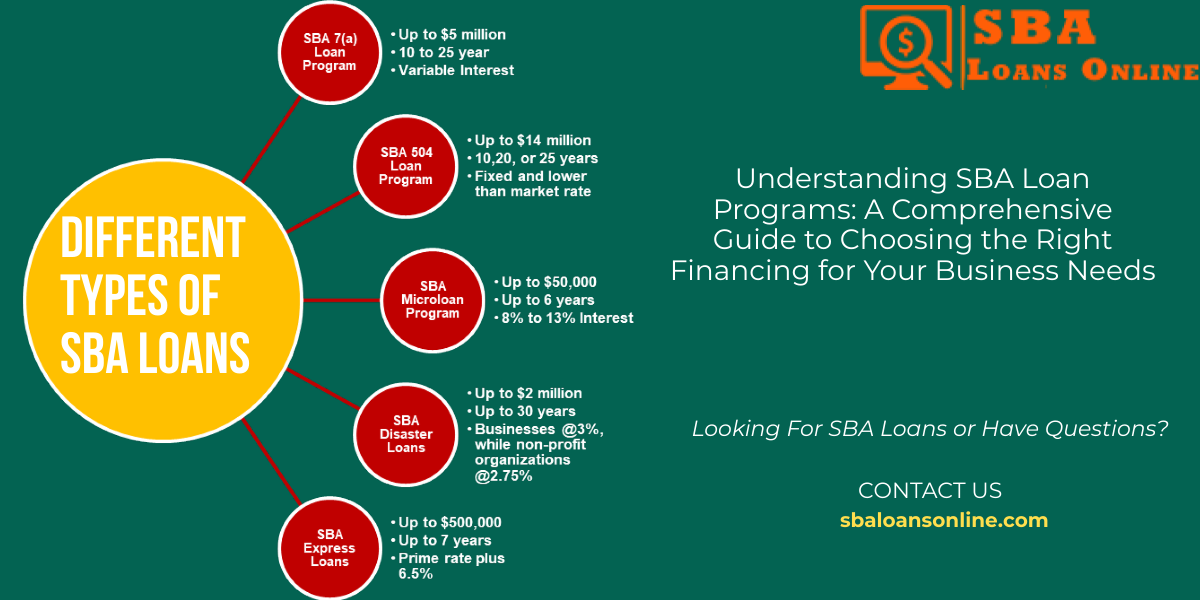The SBA loan programs are financial assistance options provided by the Small Business Administration (SBA), a U.S. government agency. These loan programs are designed to help small businesses access funding that they may not be able to get through traditional lending channels. When looking for an SBA loan, it’s important to understand the various loan options available. Each is tailored to specific business requirements, so the best option relies on your objectives and financial conditions. Here is an overview of the most typical SBA loan programs.
- SBA 7(a) Loan Program
The SBA 7(a) Loan Program is the most popular SBA loan option, providing flexibility and a wide range of uses for small businesses. It is frequently regarded as the go-to loan for firms needing money to launch, expand, or stabilize operations.
Loan amount: up to $5 million
Terms: working capital repayment terms can be up to 10 years, whereas real estate repayment terms will be up to 25 years.
Interest rate: typically, variable but limited by the SBA. It is typically a combination of the prime rate and a fixed fee.
This loan program is an idea for businesses requiring flexible capital for various purposes, including start-ups and established businesses with less-than-perfect credit.
- SBA 504 Loan Program
The SBA 504 Loan Program is intended to help small firms acquire important fixed assets, such as real estate and equipment, by providing long-term financing at competitive rates.
Loan amount: the SBA 504 loan typically up to $14 million, with a private lender providing some of the capital and a CDC providing the rest.
Terms: depending on the asset being financed, the terms can be 10,20, or 25 years.
Interest rate: For real estate and long-term investments, the interest rate is fixed and generally lower than the market rate.
The SBA 504 Loan Program is an effective financing instrument for firms wishing to make big investments in real estate or equipment, as well as an attractive option for businesses seeking capital for major fixed asset purchases.
- SBA Microloan Program
The SBA Microloan Program is intended to offer small businesses and some non-profit organizations with small, short-term loans to help them pay working capital, inventory, equipment, or other necessary business needs. It is especially beneficial for start-ups and businesses with limited access to traditional financing.
Loan amount: up to $50,000. On average, the loan amount ranges from $10,000 to $15,000. These smaller loan amounts are intended to meet the financing requirements of microenterprises and smaller start-ups.
Terms: up to six years
Interest rate: typically, between 8% and 13%
- SBA Disaster Loans
This loan offers low-interest loans to businesses, homeowners, and renters that have incurred financial losses because of natural or manmade disasters. These loans are designed to help individuals and businesses recover by covering the costs of repairs, property replacement, and other disaster-related expenses.
Loan amount: up to $2 million
Terms: up to 30 years
Interest rate: Businesses are charged a fixed rate of 3%, while non-profit organizations pay 2.75%
These loans, with their low interest rates, extended repayment terms, and flexibility in how the funds might be used, provide a key lifeline for disaster recovery.
- SBA Express Loans
The SBA Express Loan is part of the SBA 7(a) Loan Program and is designed for small enterprises that require quick access to capital. It offers a streamlined process with speedier approval and distribution than regular SBA 7(a) loans, making it an attractive choice for firms with immediate financial requirements.
Loan amount: up to $500,000
Terms: up to 7 years
Interest rate: A bit higher than the standard 7(a) loan, often prime rate plus 6.5%
The loan limit of $500,000 and somewhat higher interest rates compared to standard SBA loans may be restrictive for businesses with larger financial requirements. If you require a lower loan amount and faster access to money, the SBA Express Loan may be an excellent option for your business.
Summary – Different Types of SBA Loans
| Type of Loans | Purpose | Loan amount | Terms | Interest Rate |
| SBA 7(a) 504 Loan Program | Working capital and real estate | Up to $5 million | Working Capital – 10 years
Real Estate – 25 years |
combination of the prime rate and
a fixed fee. |
| SBA 504 Loan Program | Real
estate and equipment |
Up to $14 million | Depends on assets with the terms 10,20, or 25 years. | Fixed and lower
than the market rate. |
| SBA Microloan Program | Microenterprises and smaller
start-ups. |
Up to $50,000. | Up to six years | 8% to 13% |
| SBA Disaster Loans | Covering the costs of repairs, property replacement, and other disaster-related expenses | Up to $2 million | Up to 30 years | Businesses @3%, while non-profit organizations @2.75% |
| SBA Express Loans | faster access to capital; speedier approval | Up to $500,000 | Up to 7 years | Prime rate plus 6.5% |
SBA does not provide loans directly, rather through approved SBA loan lenders. To apply for SBA loan, you will likely need to contact an SBA approved lender like Robinson & Associates LLC. With experienced SBA loan advisors, we can guide you throughout the loan process and help you in offering specialized financial solutions for your business.
At our firm, we’re dedicated to empowering businesses with the resources and guidance they need to succeed. If you’re ready to explore SBA loan options or have questions about how we can assist you, we invite you to contact us for a consultation.

